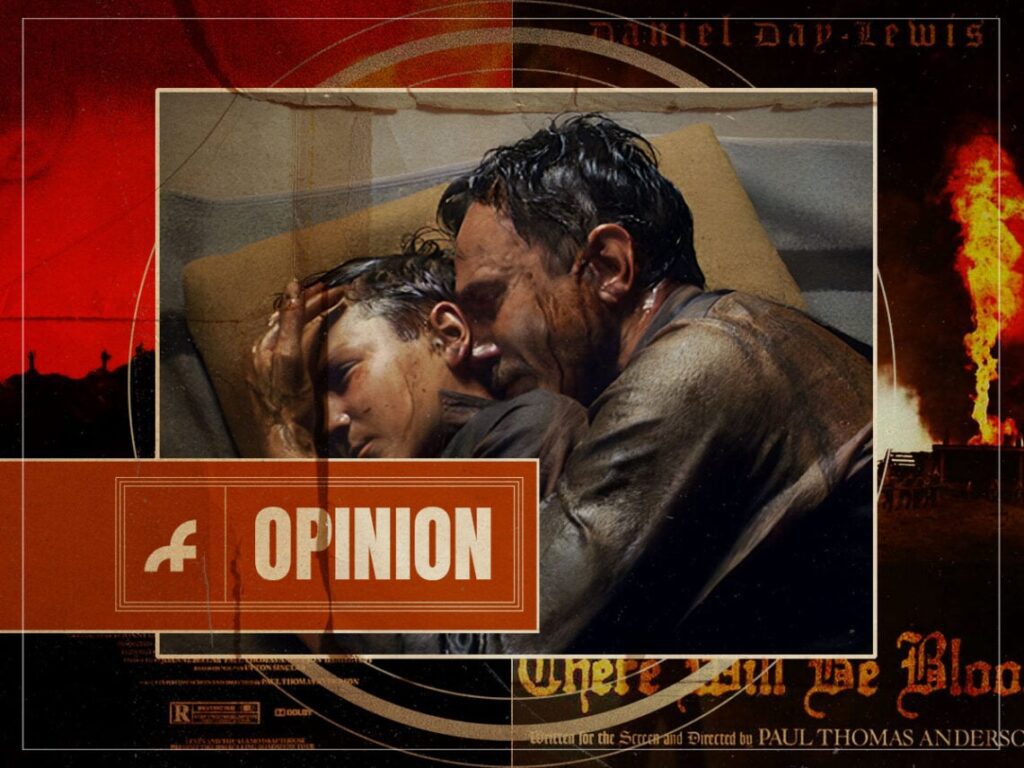‘There Will Be Blood’: How Paul Thomas Anderson’s greatest movie sets fire to capitalism
 Posted On
Posted On
(Credits: Far Out / Paramount Vantage)
Paul Thomas Anderson is a deeply idiosyncratic, versatile, and talented filmmaker, known for exploring the search for meaning within the most vulgar, controversial, and violent aspects of life. The project that best encapsulates this approach is, without a doubt, the brilliant 2007 release There Will Be Blood.
At the tail end of the Iraq War, people were starting to realise how much they’d been duped. This was, above all, an oil war. There was money to be made for the upper echelon of the American government in carrying on its invasion. As this realisation dawned, Anderson took audiences on an epic journey to the dark heart of capitalism.
There Will Be Blood examines the malicious and tenebrous origins of the oil trade and the sinister underpinnings of the American dream. Oil is a shadowy hand that destroys everything it touches. The oilman will sacrifice anything and everything for the bottom line – the almighty dollar. Daniel Plainview is an effigy of the capitalist without compassion. A character who’s always looking for an opportunity – one of the first things he does is to take a dead man’s baby as his own. We find out pretty much immediately that this is not out of altruism but narcissism. Eventually, this child will become his mascot. This child will make him rich.
At its core, the film delves into these themes through the lens of masculine family dynamics. Paul Dano plays a dual role, though it’s easy to recall just one. He first appears as Paul Sunday, the informant who directs Plainview to the Sunday family—people he sees as weak and easily manipulated, ideal for Daniel’s exploitation. Dano’s subsequent portrayal of Eli Sunday, Paul’s twin brother, stands out as one of his finest performances. Eli is a pitiful yet sympathetic character who embodies everything Daniel Day-Lewis’s Plainview despises. His is an attempt to merge capital with spirituality in a rapidly industrialising America. The ultimate failure in this mission is embodied by his inability to gain power over or tame Plainview. His gory fate shows us that whatever purity we might have in our attempts to gain control over the beast of capital, we will be its meat.
Day-Lewis’s portrayal of the industrialist’s downfall is captivating because it’s purely moral. As Plainview becomes more successful, the rot inside him grows—any goodness that might have existed is quickly overtaken by selfishness and hypocrisy. One of the film’s most compelling aspects is Anderson’s ability to externalise internal conflict. For instance, the breakdown of communication between father and son is literalised by the son’sdeafness. As Daniel loses sight of his son’s value to him, they become utterly unable to communicate—he even refuses to learn sign language. Their final conversation requires an interpreter, starkly symbolising their estrangement.
The film was Anderson’s most ambitious yet. While Boogie Nights, Magnolia, Punch-Drunk Love, and even Hard Eight burst onto the screen, There Will Be Blood builds anticipation gradually. The film explodes with Anderson’s magnificent set pieces reminiscent of the oil field fires in William Friedkin’s Sorcerer and Werner Herzog’s Lessons of Darkness. Both films portray oil as a quintessential symbol of capitalism’s inherent rot—a substance simultaneously destroying and sustaining the Earth and its people. Herzog’s film, which decontextualises images from the Kuwaiti oil field fires, suggests that our perpetual conflict over this precious yet dangerous resource transforms our planet into an alien landscape.
Anderson paints this need for more oil as a kind of bloodlust, one that sneaks up on its subjects but is nonetheless an expression of their most malicious and masochistic traits. The final act and Lewis’s performance in the film’s closing moments solidify this. Reminiscent of Philip Baker Hall’s Nixon in Secret Honor, this character completely falls apart before our eyes. The effigy is destroyed. All this violence finally reaches its end. Plainview is a snivelling, deplorable caricature, yet it remains incredibly compelling to watch.
The final act of violence, in which Eli Sunday’s head is split open with a bowling pin as Plainview screams, “I am the third revelation”, was controversial at the time. It’s extraordinarily pessimistic but not without merit. Plainview is essentially saying there is no God anymore except the almighty dollar—and it’s up to the viewer whether or not they believe him.
[embedded content]
Related Topics


